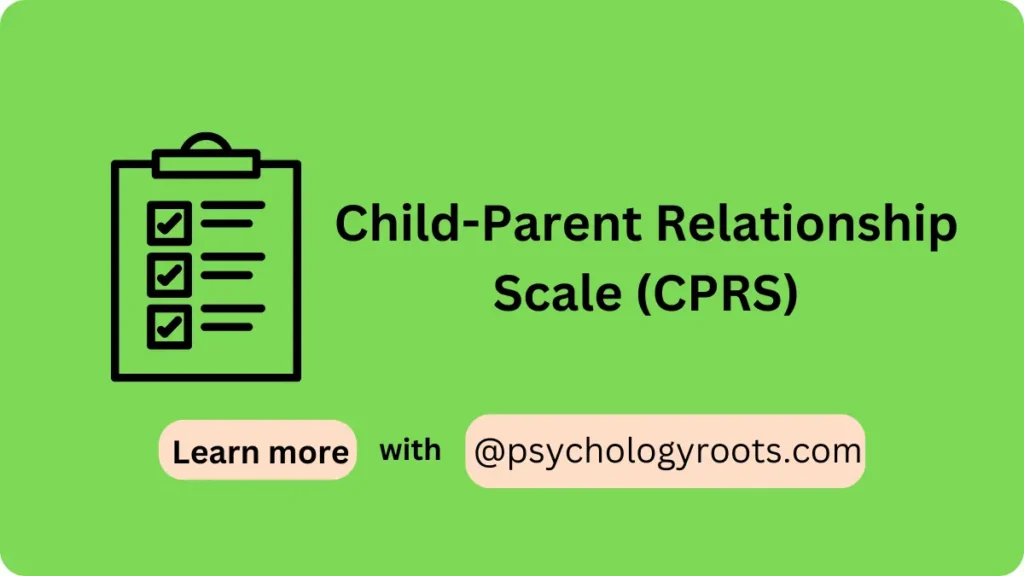Table of Contents
Child-Parent Relationship Scale (CPRS)
Here in this post, we are sharing the “Child-Parent Relationship Scale (CPRS)”. You can read psychometric and Author information. We have thousands of Scales and questionnaires in our collection (See Scales and Questionnaires). You can demand us any scale and questionnaires related to psychology through our community, and we will provide you with a short time. Keep visiting Psychology Roots.
About Child-Parent Relationship Scale (CPRS)
Scale Name
Child-Parent Relationship Scale (CPRS)
Author Details
Dr. Robert C. Pianta (pianta@virginia.edu)
Translation Availability
Not Sure

Background/Description
The Child-Parent Relationship Scale (CPRS) is a widely utilized assessment tool designed to evaluate the quality and nature of relationships between parents and their children, particularly in the context of early childhood education. Developed by Dr. Robert C. Pianta, the scale draws on attachment theory and developmental psychology principles to capture key dimensions of the parent-child relationship, including warmth, conflict, and dependency.
Originally developed as part of the NICHD Study of Early Child Care and Youth Development, the CPRS has been extensively validated and is often used in both clinical and research settings. It provides insights into the emotional bond between parents and their children and can help identify areas where the relationship may be contributing to the child’s emotional and behavioral outcomes. The scale consists of 30 items that parents rate on a 5-point Likert scale, ranging from “Definitely does not apply” to “Definitely applies.” These items are grouped into subscales that measure different aspects of the relationship, such as closeness, conflict, and dependency.
The CPRS is particularly useful in understanding the nuances of parent-child interactions in early childhood, but it can also be adapted for use with older children. Its applications are broad, spanning from routine assessments in educational settings to in-depth analyses in therapeutic contexts. By providing a structured way to assess the parent-child relationship, the CPRS contributes valuable information that can guide interventions aimed at improving family dynamics and promoting positive developmental outcomes for children.
Administration, Scoring and Interpretation
- Preparation: The parent or primary caregiver is briefed about the purpose of the assessment and how to complete the scale.
- Questionnaire Completion: The parent or caregiver completes the 30-item questionnaire, rating each statement based on their perception of their relationship with the child. This process usually takes about 10-15 minutes.
- Scoring: Responses are scored on a 5-point Likert scale. The scores for the subscales (e.g., closeness, conflict, dependency) are calculated by summing the relevant items.
Reliability and Validity
The CPRS has demonstrated strong psychometric properties, with high reliability and validity across various studies. The internal consistency of the subscales is typically reported as being in the range of 0.70 to 0.90, indicating good reliability. Test-retest reliability is also strong, ensuring that the scale produces consistent results over time.
In terms of validity, the CPRS has been shown to correlate well with other measures of parent-child relationships and child outcomes, such as behavioral assessments and academic performance. Construct validity is supported by the scale’s ability to distinguish between different types of parent-child relationships, and its predictive validity is evidenced by its ability to predict child outcomes in both the short and long term.
Available Versions
30-Items
15-Items
Reference
Pianta, R. C., Smith, N., & Reeve, R. E. (1991). Observing mother and child behavior in a problem-solving situation at school entry: Relations with classroom adjustment. School Psychology Quarterly, 6(1), 1.
Pianta, R. C. (1992). Child-parent relationship scale. Unpublished measure, University of Virginia, 427.
Driscoll, K., & Pianta, R. C. (2011). Mothers’ and Fathers’ Perceptions of Conflict and Closeness in Parent-Child Relationships during Early Childhood. Journal of Early Childhood & Infant Psychology, (7).
Important Link
Scale File:
Frequently Asked Questions
Q: Who can administer the CPRS?
A: The CPRS can be administered by trained professionals such as psychologists, counselors, or researchers who are familiar with parent-child relationship dynamics.
Q: How long does it take to complete the CPRS?
A: The CPRS typically takes about 10-15 minutes to complete.
Q: Can the CPRS be used with older children?
A: While originally designed for early childhood, the CPRS can be adapted for use with older children, depending on the context of the assessment.
Q: What does the CPRS measure?
A: The CPRS measures key dimensions of the parent-child relationship, including closeness, conflict, and dependency.
Disclaimer
Please note that Psychology Roots does not have the right to grant permission for the use of any psychological scales or assessments listed on its website. To use any scale or assessment, you must obtain permission directly from the author or translator of the tool. Psychology Roots provides information about various tools and their administration procedures, but it is your responsibility to obtain proper permissions before using any scale or assessment. If you need further information about an author’s contact details, please submit a query to the Psychology Roots team.
Help Us Improve This Article
Have you discovered an inaccuracy? We put out great effort to give accurate and scientifically trustworthy information to our readers. Please notify us if you discover any typographical or grammatical errors.
Make a comment. We acknowledge and appreciate your efforts.
Share With Us
If you have any scale or any material related to psychology kindly share it with us at psychologyroots@gmail.com. We help others on behalf of you.